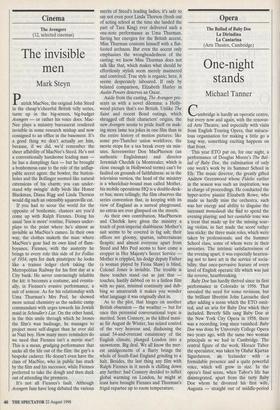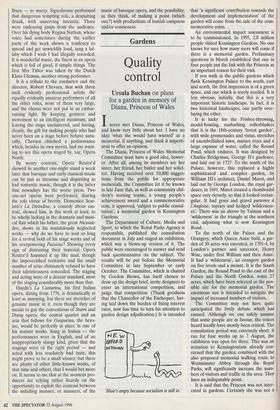Opera
The Ballad of Baby Doe La Dirindina La Cantarina (Arts Theatre, Cambridge)
One-night stands
Michael Tanner
Cambridge is hardly an operatic centre, but every now and again, with the renovat- ed Arts Theatre, and especially with visits from English Touring Opera, that miracu- lous organisation for making a little go a long way, something exciting happens on that front.
This year ETO put on, for one night, a performance of Douglas Moore's The Bal- lad of Baby Doe, the culmination of only one week's work by its Summer School in Ely. The music director, the greatly gifted Andrew Greenwood whose Fidelio earlier in the season was such an inspiration, was in charge of proceedings. He conducted the hyper-active pianist Elizabeth Rowe, who made us hardly miss the orchestra, such was her energy and ability to disguise the incessant tremolandi she had to spend the evening playing; and her cantabile tone was a treat that made up for the missing soar- ing violins, in fact made the score rather less sticky; the three main roles, which were taken by professionals; and the Summer School class, some of whom were in their seventies. The intrinsic satisfactoriness of the evening apart, it was especially hearten- ing not to have art in the service of socia- bility, that once-pervasive feature of every level of English operatic life which was just the reverse, heartbreaking.
Baby Doe has hardly thrived since its first performance in Colorado in 1956. That revealed the need for some revisions, but the brilliant librettist John Latouche died after adding a scene which the ETO omit- ted, and an aria for Baby Doe which they included. Beverly Sills sang Baby Doe at the New York City Opera in 1958, there was a recording, long since vanished. Baby Doe was done by University College Opera two years ago, with the same two woman principals as we had in Cambridge. The central figure of the work, Horace Tabor the speculator, was taken by Olafur Kjartan Sigurdarson, an Icelander with a formidable presence and a quite powerful voice, which will grow in size. In the opera's final scene, when Tabor's life has disintegrated, apart from the tarty Baby Doe whom he divorced his first wife, Augusta — straight out of middle-period Ibsen — to marry, Sigurdarson performed that dangerous tempting role, a despairing drunk, with unnerving intensity. There were endearing gasps from the audience. Over his dying body Regina Nathan, whose voice had sometimes during the earlier parts of the work shown a tendency to spread and get unwieldily loud, sang a lul- laby which I wish I had illegally recorded. It is wonderful music, the finest in an opera which is full of good, if simple things. The first Mrs Tabor was taken by the Dutch Klara Uleman, another strong performer.
It is a tribute to the conductor and the director, Robert Chevara, that with three such evidently professional artists the equally evidently amateur performers of all the other roles, none of them very large, and the chorus were not put in an embar- rassing light. By keeping gestures and movement to an intelligent minimum, and leaving the stage uncluttered, and having, clearly, the gift for making people who had never been on a stage before behave natu- rally, Chevara clinched a performance which, besides its own merits, had me want- ing to see this opera staged by, say, Opera North.
By weary contrast, Opera Restor'd showed in another one-night stand a week later that baroque and early classical music can be just as tiresome and dispiriting as bad romantic music, though it is the latter that nowadays has the worse press. Two one-act operas were performed, sharing the sole virtue of brevity. Domenico Scar- latti's La Dirindina, a comedy about cas- trati, showed him, in this work at least, to be wholly lacking in the dramatic and musi- cal flair which his father, the great Alessan- dro, shows in his scandalously neglected works — why do we have to wait so long for a revival both of his stage works and of his overpowering Passions? Showing every sign of distrusting their material, Opera Restor'd hammed it up like mad, though the impoverished recitative and the small number of arias obstinately refused to have their talentlessness concealed. The staging and acting were of a decent standard, most of the singing considerably more than that.
Haydn's La Cantarina, his first Italian opera, dating from 1776, is dramatically at least as annoying, but there are stretches of genuine music in it, even though they are meant to guy the conventions of Sturm and Drang opera; the central quartet and an aria that follows for Gasparina, the hero- ine, would be perfectly in place in one of his mature works. Sung in Italian — the performances were in English, and of an inappropriately slangy kind, given that the stagings were of the right period — and acted with less resolutely bad taste, this might prove to be a small winner; but there are plenty of other little-known works, of that time and others, that I would bet more on. It seems to me that at the moment pro- ducers are relying rather heavily on the opportunity to exploit the contrast between the unfailing manner, or manners, of the music of baroque opera, and the possibility, as they think, of making a point (which one?) with productions of loutish campness and/or coarseness.

























































 Previous page
Previous page